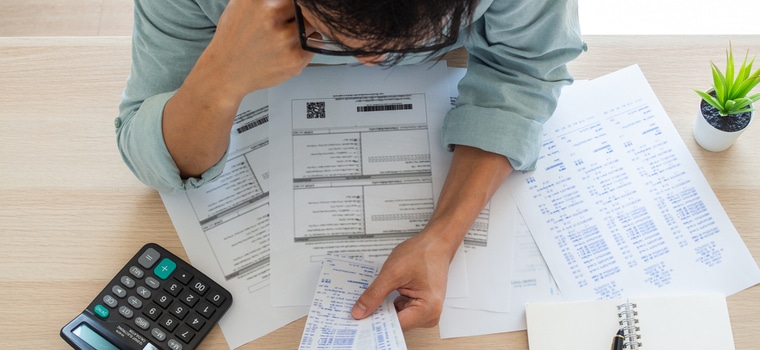Debt doesn’t have to be something you live with forever, and paying down high or expensive balances can improve your finances. Take action to tackle your outstanding balances with these five steps.
Step 1: Check Balances and Interest Rates
Before you do anything, make sure you know what kind of debt you’re actually dealing with. Gather all of your credit card and loan statements, and check the outstanding balance of each. Then check each card’s or loan’s interest rate.
Make two lists of all your accounts: biggest balance to smallest balance and highest interest rate to lowest interest rate.
Step 2: Prioritize Your Debts
To figure out how to best pay off debt, you need to prioritize multiple balances. You have two main options.
- Pay off the smallest balance first. Called the debt snowball method, paying off the smallest balance first and then moving to the next smallest balance gives you mental momentum as you start to cross off debts entirely. Of course, you must continue to make (at least) minimum payments on all of your other balances.
- Pay off the debt with the highest interest rate first. This method is called the debt avalanche method. It prioritizes the account with the highest interest rate, because that debt will cost you more over time. Once that debt is paid, move to the debt with the next-highest interest rate. Be sure to continue making (at least) minimum payments on all of your other balances.
So which should you choose — debt snowball or debt avalanche? Each strategy has its own advantage, so pick the option that works best for you and stick with it.
Step 3: Make a Budget
Once you know which debts to focus on, make a budget. Figure out how much you spend each month compared to how much you earn, then find realistic ways to reduce your spending. Do you hit Starbucks every morning? Cut back on your weekly visits (slowly…we know this hurts) and brew your own to-go cup of joe. Do you eat lunch out every day? Start bringing your lunch to work. If you prep it the night before so it’s easy to grab it and go – it helps cut back on the temptation to eat out.
Step 4: Put Extra Cash Toward Debt
Anytime you make any money beyond your usual paycheck, put it directly toward your debt priorities. If you get a raise, pledge it to paying down debt. If you start a side hustle, use that extra income to pay down debt. If your grandmother gives you a birthday check, instead of treating yourself to a shopping spree, well, you know the drill.
Step 5: Pay More Than the Minimum Due or Double Up Your Payments
Every extra dollar you pay over the minimum amount due is applied directly to your principal. Even paying an extra $10 each month can help you make progress. And if you can double up your payments, you’ll reach a zero balance much quicker.
For example, let’s say you have $5,000 in debt on a credit card with a 19% interest rate, and you pay $200 per month. At this cadence, it’ll take you 33 months to pay off the balance. However, if you double your payments to $400 each month, your $5,000 will be paid off in 15 months.
Bonus Tip: For cards with higher interest rates, call the lender or creditor to ask for a lower interest rate. You could also transfer your balance to a lower interest rate card.
Create and Celebrate Goals
As your debt falls and you get closer to your goal, it’s important to stay motivated. Celebrate when you pay off your first $500 with a small, budget-friendly treat for yourself (maybe a stop at Starbucks…but not a new pair of shoes).
Tiny rewards can help you stay on track so you can successfully make your debt vanish.




